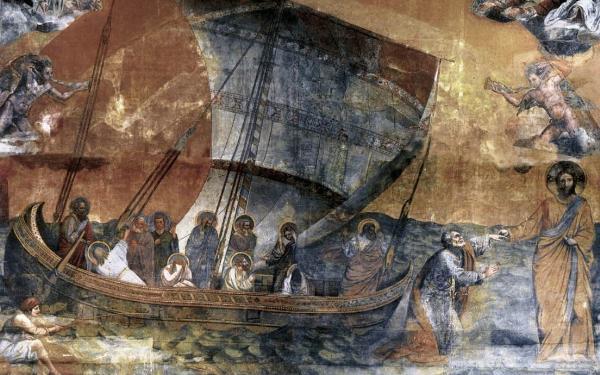11 October 2012 marks two significant anniversaries for the Church, and Pope Benedict has invited us to mark this occasion by undertaking a process of renewal of our faith. Damian Howard SJ opens Thinking Faith’s series for the Year of Faith by reflecting on why a whole year devoted to the experience and practice of faith could be a moment of healing for the Church.
Pope Benedict XVI has declared 11 October 2012 to be the opening of a ‘Year of Faith’, thirteen months (and a bit) dedicated to a renewal of the Church’s joy and enthusiasm for the encounter with her Lord. In the opening sentences of his apostolic letter, Porta Fidei, he presents as succinct a presentation of his vision of the life of faith as one could hope for:
The ‘door of faith’ (Acts 14:27) is always open for us, ushering us into the life of communion with God and offering entry into his Church. It is possible to cross that threshold when the word of God is proclaimed and the heart allows itself to be shaped by transforming grace. To enter through that door is to set out on a journey that lasts a lifetime.[1]
It is no coincidence that this day also marks both the 50th anniversary of the first session of the Second Vatican Council and the 20th anniversary of the publication of the Catechism of the Catholic Church, a volume now widely accepted as a valuable resource for teaching the faith as well as a nourishing point of reference for anyone wanting to engage with Catholic belief in all its richness. These anniversaries are clearly important and well worth marking; but why with a ‘Year of Faith’?
Leadership in trying times
One easy answer is to speculate that, with encyclicals already written on the other two theological virtues, love [2] and hope [3], the pope is preparing to complete a trilogy with one on faith. But to get at the deeper reasons, it might help to reflect a little on the onerous task of the religious leader in the contemporary world. What do you do if you are responsible for the unity of a vast global religious community but your flock is showing worrying signs of not wanting to stay together? Pope Benedict’s overtures, so costly to him personally, to the traditionalists of the Society of Saint Pius X seem to have come up against a very hard brick wall. They refuse point blank to recognise the teaching of Vatican II. Meanwhile, the Congregation for the Doctrine of Faith has found itself embroiled in an unpopular confrontation with the Leadership Conference of Women Religious in the United States, an organisation that seems to want to go beyond Vatican II, an aspiration which some saw echoed in the late Cardinal Martini’s supposed ‘parting-shot’ at a Church that refuses to face the modern world. Blog-talk of an unbridgeable divide between ‘liberals’ and ‘conservatives’, which most Catholics know to be at best over-simplistic, at worst downright un-Christian, is getting harder to dismiss.
The problem is not that there is vigorous disagreement; this the Church has always known and it is not likely to dry up this side of the eschaton. Rather it is that the value of unity, of simply staying together, even of putting up with one another for the sake of Christ, seems to be on the wane. It is not for nothing that the word ‘communion’ crops up more and more in papal documents…
Why is this a particular problem now? People will answer that question in all sorts of ways. What strikes me is that division in the global Church is fomented to a great extent by the painful political impasse in the United States, a bitter cultural divide which is on view in the current presidential election campaign and grows ever deeper and more destructive. Politics is a more cynical business than it has been for a long time with many having given up on that fundamental pillar of healthy civil life, the conviction that that even if the other person espouses views I find hard to understand, they are nevertheless worthy of respect and engagement. In place of this we risk settling for a culture of demonization. When people stop respecting one another politics gets ugly. In the Church it is far, far worse; we end up betraying the Gospel.
What is a spiritual leader to do? One idea is to encourage people to listen to one another as they explain their positions and tell their stories. This is what the Anglican Communion tried at the Lambeth Conference of 2008. The Archbishop of Canterbury, Dr Rowan Williams, invoked a Zulu word, Indaba, hoping that listening intently to the concerns of one’s brothers and sisters in Christ would touch hearts and mend bridges. It is a good way forward but it depends ultimately on some considerable degree of empathy already being in place. What do you do when even that is in critically short supply?
Pope Benedict’s proposal is not that we try to talk things through with one another, rehearsing arguments we have used and heard before. Instead, he is calling us to go deeper with our own faith, both as individuals and as a community.
The injunction to ‘go deep’ is actually quite a radical one. It suggests that, as more and more of us get swept along by the pantomime culture (‘Oh yes it is!’ … ‘Oh no it isn’t’), the underlying problem is a superficiality in which all sides share. As the pope observes:
It often happens that Christians are more concerned for the social, cultural and political consequences of their commitment, continuing to think of the faith as a self-evident presupposition for life in society. In reality, not only can this presupposition no longer be taken for granted, but it is often openly denied.[4]
One thing that everyone shares in the current crisis is the belief that being Christian has ‘social, cultural and political consequences’; they just disagree violently on what they are. Pope Benedict, by pointing to something we might all have overlooked, is doing something more interesting and creative than taking sides, let alone asking us all just to talk things through. (Indulging in an exchange of shallowness was never likely, after all, to lead to anything new.) Instead, the invitation is to overcome our resistance to being converted ‘at depth’, and that is something everyone can undertake.
Whatever happened to ‘faith’?
The ‘crisis of shallowness’ is not unrelated to the recent career of the word ‘faith’ itself. Not so long ago, ‘faith’ came to be accepted in the English-speaking world as an attractive substitute for the word ‘religion’. Partly this was the result of an academic debate about whether it was useful to describe things as ‘religions’ at all, partly because religion in post-modern societies had been tainted by association with another word, ‘organised’. (Have you ever come across a disorganised religion, by the way?). And so it is that today we talk nonchalantly about faith-communities, faith-schools, faith-perspectives, interfaith dialogue and even (I once heard talk of) faith providers. All religions are simply faiths. Sorted.
Is it not just monumental grumpiness to criticise such an unremarkable change of vocabulary? Not necessarily. The word ‘faith’ plays a particular role in the fabric of Christian belief. We all believe, for instance, that we are justified by faith, Protestants and Catholics. Faith, in the biblical sense, will forever be associated with Abraham, who without so much as a by-your-leave left home and journeyed far into foreign territory at God’s command; with Mary, whose unconditional fiat (‘let it be’) ushered in the era of salvation; and with Paul, the fanatical Pharisee who gave up his meticulous observance of the priestly code of purity to take a chance on a crucified itinerant from Galilee. That is already to allude to what we might call a ‘thick’ description of the experience of faith. Can it really be transposed so easily to cover the experience of Jews, Muslims, Hindus, Buddhists and the rest, some of whom have analogues of ‘faith’ and some who do not?
Whether you find this problematic or not, it has at least one rather unfortunate corollary. When faith becomes a catch-all term designed to cover a multitude of extremely varied religious experiences, it ends up denuded of any substantial content. It becomes an empty shell of a word. And in the case of ‘faith’ that has happened with a vengeance. If you do not mind the entirely predictable reference to Richard Dawkins, the term has come to mean simply, ‘blind trust, in the absence of evidence, even in the teeth of evidence’.[5] One may resent an evangelical atheist using his own definition as a straw man, easy to demolish, but many ordinary, secular-minded people assume this is what the word means and not a few religious go along with them. The trouble is that if that is your working definition of faith, it is impossible for any intelligent or responsible person to defend it, let alone advocate it as a great virtue. Believing something incredible when you have no evidential warrant for it is hardly an admirable thing to do.
Just when you thought things could not get worse, they do. With understandable indignation, Dawkins’ religious opponent ventures an audacious response: ‘You may complain about “faith-heads” believing things without proof. Well, sir, you do exactly the same thing! You, too, are a man of faith!’ This opportunistic gambit proceeds to draw attention to the fact that even the most rational of scientists has to accept certain axiomatic truths before s/he can pursue the discipline of science. For example, they need to believe that the world operates in a law-governed way before they set about discovering what those laws are. No amount of scientific research will ever prove that everything that takes place in the universe is law-governed. It is an axiom, something one just has to assume. Likewise, if you are materialist, believing that all that exists in the world is matter, you can never prove that by empirical study of reality. It is an axiom. You can see why, if you have a denuded picture of ‘faith’, this might look like another ‘faith position’, an assumption that is unjustified because it is not provable. Is this really faith? If you follow the empty definition, ‘blind trust in the absence of evidence’ then you have little choice but to say, ‘why not?’
By now we have reached a pretty pass. Faith is everywhere, a totally pervasive, anaemic aspect of human life, unavoidable and fundamentally irrational. All that is left is to choose which axioms, beliefs, assumptions and dogmas ‘work for me’.[6] Having made my mind up, I will head off into the nearest cyber-haven of the like-minded and we shall pass the time calling everyone else nasty names. No wonder politics and religion soon follow suit.
The call to ‘go deep’ hinges necessarily on rehabilitating, revivifying the way we think and speak about ‘faith’. And there are no short cuts here. This is work each person has to do for themselves. That is why Thinking Faith is offering a series of articles over the forthcoming year to help Christians (and anyone else who is interested) to rediscover and make their own what Pope Benedict calls ‘the joy of believing and the enthusiasm for communicating the faith’.[7]
Holding on
But just in case you are eager to get going and are asking yourself, ‘Well what is faith, if Dawkins is wrong?’, here is a quick pointer at one way of coming at the question. Because faith, at least in the Catholic tradition, really is not, ‘blind trust in the absence of evidence’; quite the opposite.
Let’s go back to the Gospel, taking the case of Peter walking on the water in Matthew 14: 22-33 . Peter has just done something rather astonishing. In the middle of a storm at sea, he has asked the Lord to call him to walk with Him on water. Rather an unusual request, you would have to admit, and certainly not one made in the absence of evidence: there is Jesus, flesh and bone, walking on water right before his eyes. (Whether you, modern reader that you are, believe in this miraculous story is quite another matter…) Jesus then calls to Peter and, lo and behold, the disciple actually steps out of the boat, even managing to take a few steps … before things go wrong.
In Peter’s place I would be feeling rather pleased with my capacity for faith. What, then, do you make of Jesus’s rebuke to him, ‘You of little faith!’? How did Peter’s brave actions indicate a lack of faith?
… when he saw the wind, he was afraid and, beginning to sink, cried out, ‘Lord, save me!’
Peter’s unfaith seems to consist in his losing confidence when he looks at what he is doing. He ‘sees the wind’ and fear takes over. Peter would have shown faith, we can assume, by continuing to have confidence in what he was doing successfully in spite of the cognitive dissonance involved in walking on a substance that usually does not hold you up. That is hardly clinging to an unjustified assumption in the teeth of evidence; he had already taken several steps. He had learned that, with Jesus, he could do anything. But for entirely understandable reasons he could not hold on to what he had learned when he looked down.
That is a rather interesting portrayal of faith as a certainty that takes hold of you deep down because you have learned it in the most personal way, and yet which you have to make an effort to hold on to when appearances conspire to make it look doubtful.
Faith understood in this way is Christ-centred. For Christians, that profound personal truth which has always been and will always be accessible to us is no mere axiom, nor even a doctrinal definition, but the person of Jesus Christ Himself. For people who come to faith in adult life it often takes the form of a recognition of a presence they had hitherto been only aware of faintly, familiar yet taken for granted, too close and unassuming to foist Himself upon them. In this sense, He is the object of all faith. The challenge of faith, of holding fast to what we have learned even when trusting feels foolish, arises because of the way Jesus lives. He doesn’t cling to the headlines but gets Himself born in a stable; He doesn’t write manuals of philosophy but lives a life that looks like folly; He doesn’t ascend a throne but ends up on a cross. Christ, as Mary Magdalene found, makes Himself hard to cling on to because of the sorts of places He has to go to.
I do not offer this as just another reductionist definition of faith; it is instead, I hope, a doorway to further personal exploration. How do I cultivate, embrace and grow in faith like this in daily life? How is it that a person can come to have deep-down knowledge of this kind in the first place? Do believers of other religions ever have faith like this? Do scientists, for that matter? Is such a thing really of value in our society and, if so, why? And what kind of world do we live in if it can make itself so opaque to the truth? As the Year of Faith gets underway we can lay out the questions and, in a year’s time, see how our answers look, in the hope that a year’s serious questing turns out to be good news for us and healing for the Church and for the world. For,
[o]nly through believing […] does faith grow and become stronger; there is no other possibility for possessing certitude with regard to one’s life apart from self-abandonment, in a continuous crescendo, into the hands of a love that seems to grow constantly because it has its origins in God.[8]
Damian Howard SJ teaches theology at Heythrop College, University of London. He is also on the editorial board of Thinking Faith.
[1] Porta Fidei §1.
[4] Porta Fidei §2.
[5] The Selfish Gene. 2nd edn (Oxford: Oxford University Press, 1989), p. 198.
[6] I am grateful to Ed Miliband, the atheist leader of the British Labour Party, who this week, right on cue, described himself as a ‘man of faith’: http://www.telegraph.co.uk/news/politics/ed-miliband/9581688/Ed-Miliband-tells-Labour-Conference-we-are-the-one-nation-party.html
[7] Porta Fidei §7.
[8] Dominus Iesus §7.
More articles for the Year of Faith:
![]() ‘Faith in the Gospels’ by Peter Edmonds SJ
‘Faith in the Gospels’ by Peter Edmonds SJ
![]() ‘A Contemplative Space:
‘A Contemplative Space:
Pondering God’s mystery across faiths ’ by Michael Barnes SJ
![]() ‘Faith in the Old Testament’ by Nicholas King SJ
‘Faith in the Old Testament’ by Nicholas King SJ
![]() ‘Faithful imagination’ by Rob Marsh SJ
‘Faithful imagination’ by Rob Marsh SJ
![]() Year of Faith
Year of Faith
![]() Heythrop College, University of London
Heythrop College, University of London






